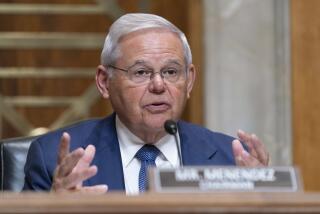Montoya Collected on ‘Code Green’ Days, Prosecutors Charge
- Share via
SACRAMENTO — Sen. Joseph B. Montoya was so eager to enrich himself that he relied on a staff notation “code green” on his office calendar to remind him when he was scheduled to receive money, prosecutors charged Wednesday as the trial of the Whittier Democrat began.
Prosecutors said that greed led Montoya to use his public position to extort money from vulnerable citizens seeking assistance on legislation.
However, in the first detailed defense of Montoya, the senator’s attorney told jurors that the veteran legislator never solicited bribes. Painting a picture of a senator who took controversial stands on legislation and sometimes antagonized his opponents, defense attorney Michael Sands said Montoya simply accepted donations given to him voluntarily.
“Sen. Montoya did not try to extort any money,” Sands said in his opening statement.
Montoya, who faces 12 felony counts of extortion, bribery, racketeering and money laundering, is the first legislator to go on trial as a result of a federal undercover investigation of political corruption in the state Capitol.
The opening statements of attorneys on both sides made it clear that the complexities of the legislative process and the large amounts of money given in payments to legislators by special interests will figure prominently in the Montoya trial.
The first witness in the case, former sports agent Michael Trope, testified that Montoya sent him a “schedule of fees” dictating the timing and amount of payments--in the form of campaign contributions and honorariums--the senator expected to receive.
Trope, who was interested in a bill affecting sports agents, also testified that Montoya and an aide pressured him to give money and to let the senator’s daughter stage her wedding in Trope’s impressive back yard.
U.S. Atty. David Levi outlined eight separate incidents in which Montoya allegedly sought payments from citizens in exchange for action on specific bills.
“This is a case about the betrayal of public trust. It is a case about an elected official who used his office for personal gain,” Levi told the jury. “He repeatedly told citizen groups that if they wanted his help as a senator, they would have to do something for him.”
Among the people whom Montoya is accused of attempting to extort are Trope, actor Ed Asner, National Football League player representative David Meggysey, several Capitol lobbyists and an undercover FBI agent. Montoya accepted a $3,000 “honorarium” from the FBI agent.
But Sands did his best to undercut Levi’s charges, arguing that in each of the eight incidents Montoya was acting in an appropriate and legal fashion.
The prosecution has contended that in 1985 Montoya attempted to extract a payment from Asner, then-president of the Screen Actors Guild, in exchange for a vote that would have helped protect members of the guild. Asner is expected to testify on behalf of the prosecution that he angrily rejected Montoya’s solicitation.
But Sands said the senator never requested money from Asner. After the two discussed the bill, the attorney said, Asner and Montoya had their photo taken with their arms around each other’s shoulders.
In other cases involving alleged extortion, Sands laid the foundation for placing the blame on naive or overzealous staff members.
Sands also said that some of the alleged victims of extortion attempts will testify that they did not feel pressure to make payments to Montoya.
Trope, who will take the stand again today to undergo cross-examination, testified that Montoya and aide Kathleen Somerton pressed him numerous times to organize a group of sports agents to give the senator an honorarium. When Trope refused, he said, the two began asking the agent--also a horse breeder--to put together a group of Arabian horse owners who could give the senator an honorarium, a request he also refused.
On one occasion, Trope testified, Montoya told him, “I support those people who support me.”
After the bill backed by Trope died in the Legislature, Trope testified, Somerton approached him with a plan to revive the measure and win its approval with as much as $25,000 he would contribute to legislators. Trope said he rejected the idea.
Subsequently, Trope testified, Montoya sent him a book with the inscription, “Hey Mike, when are we going to do some business?”
In his opening remarks, Levi portrayed Montoya as a man who decided to enrich himself sometime after first winning election to the state Senate in 1978.
“Something happened” to Montoya in 1981 or 1982, Levi said. “He began to look at his job as an opportunity for enrichment and advantage.”
More to Read
Sign up for Essential California
The most important California stories and recommendations in your inbox every morning.
You may occasionally receive promotional content from the Los Angeles Times.













